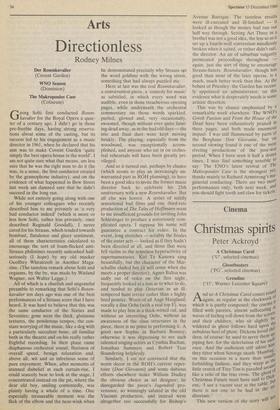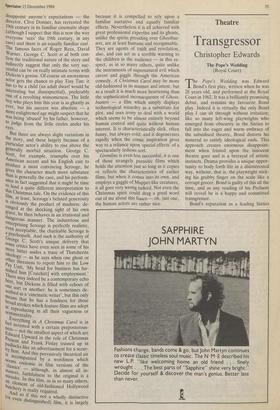Cinema
Christmas spirits
Peter Ackroyd
A Christmas Carol ('U', selected cinemas) Ghostbusters (PG', selected cinemas) Gremlins (`15', Warner Leicester Square)
And so A Christmas Carol comes rouricif again, as regular as the clockwork a. which it is partly composed; the cinenaaS 15 filled with parents, almost suffocating waves of feeling roll down from the screen' and their children, who sit slightly b,e; wildered as ghost follows hard upon t",; nebulous heel of ghost. Dickens loved CO' dren, of course: he used to serve themttl,' piping hot, for the delectation of his all v, ence. And the audiences still adore WI,' they titter when Scrooge snarls 'Humbly' on this occasion in a more than ustIn'hie forbidding fashion, and they weep as t"ci little crutch of Tiny Tim is paraded arona like a relic of the true cross. The ghost Ica" Christmas Future must have said to Dikeat ens, 'I see a vacant seat at the table, there is not one to be had in the a' ditorium.' This new version of the story will ri(lt disappoint anyone's expectations — the director, Clive Donner, has recreated the 19th century in its familiar cinematic shape (although I suspect that this is now the way everyone 'sees' the 19th century, in any case) and there is an equally familiar cast. The famous faces of Roger Rees, David Warner, George C. Scott et a/ both con- firm the traditional nature of the story and indirectly suggest that only the very suc- cessful can be on really intimate terms with Dickens's genius. Of course an anonymous actor gets the chance to play Tiny Tim: it has to be a child (an adult dwarf would be interesting but disrespectful), preferably One of a revolting winsomeness. The little boY who plays him this year is as ghastly as ever, but his success was absolute — a More enlightened age might suspect that he Was being 'abused' by his father, however, to judge from the little circles under his eyes.
But there are always slight variations in the story, and these largely because of a Particular actor's ability to rise above the generally morbid situation. George C. Scott, for example, triumphs over his American accent and his English cast to Produce a most convincing Scrooge; he gives the character much more substance than is generally the case, and his perform- ance in fact suggested that it might be time to lend a quite different interpretation to this Christmas tale. On the evidence of this !lint, at least, Scrooge's belated generosity Is obviously the product of madness: de- ranged at the shocking sight of his own grave he then behaves in an irrational and "angerous manner. The industrious and enterprising Scrooge is perfectly realistic, even acceptable; the charitable Scrooge is a Psychopath. And such is the authority of George C. Scott's unique delivery that some critics have even seen in some of his nr,ore bitter asides a trace of Thatcherite Ideology as he says when one ghost or Other threatens to report him to the Low PaY Unit, 'My head for business has fur- nished him [Cratchitt] with employment.' There may indeed be a contemporary echo here, but Dickens is filled with echoes of 00e sort or another: he is sometimes de- scribed as a 'cinematic writer', but this only Means that he has a fondness for those btroad strokes which feature films are adept a reproducing in all their vagueness or sentimentality. everything in A Christmas Carol is in fact invested with a certain preposterous- ness the smallest aspect of which are oWard Upward in the role of Christmas r t" esent and Frank Finlay trussed up in Padlocks like an advertisement for a secur- t ij firm. And this pervasively theatrical air n..e accompanied by a wordiness which endemic in film versions of the sv,?ssics, — although, in almost all in- .! faithfulness to the original is a mistake. In this film, as in so many others, !n element of old-fashioned Hollywood tit u chery is really required. (ornd so if this not a wholly distinctive even distinguished) film, it is largely because it is compelled to rely upon a familiar narrative and equally familiar effects. Nevertheless it is all achieved with great professional expertise and its ghosts, unlike the spirits presiding over Ghostbus- ters, are at least humane and recognisable. They are agents of truth and revelation, also, and can act as a terrible warning to the children in the audience — in this re- spect, as in so many others, quite unlike the instruments of supernatural evil which cavort and giggle through the American comedy. A Christmas Carol may be more old-fashioned in its manner and intent, but as a result it is much more heartening than the sophisticated inconsequence of Ghost- busters — a film which simply displays technological wizardry as a substitute for plot, and uses irony to deal with a world which seems to be almost entirely beyond human control and quite without human interest. It is characteristically slick, often funny, but always cold; and it degenerates rapidly when the comic inspiration gives way to a reliance upon 'special effects' of a spectacularly tedious sort.
Gremlins is even less successful; it is one of those strangely parasitic films which holds the attention just so long as it copies or reflects the characteristics of earlier films; but when it comes into its own, and employs a gaggle of Muppet-like creatures, it all goes very wrong indeed. Not even the Christmas spirit could drag a good word out of me about this fiasco — oh, just one, the human actors are rather nice.



















































 Previous page
Previous page